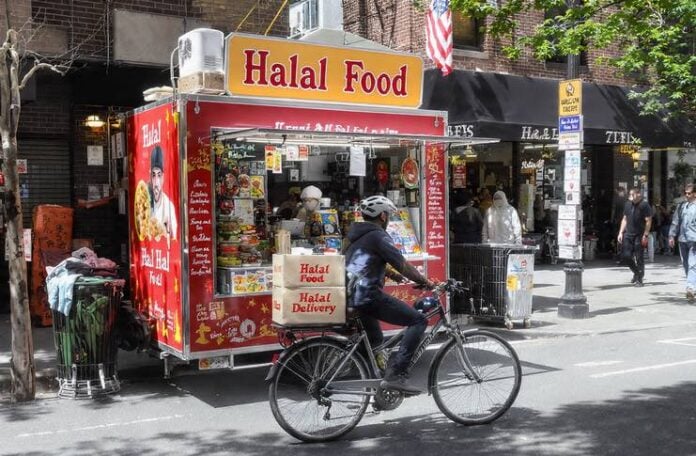If you’ve ever walked through Jackson Heights or Astoria on a Friday night, you know. There’s something electric in the air — the scent of spices, sizzling skewers, and warm flatbread drifting out of shop doorways. It’s a part of New York that pulses with a Halal rhythm, one that’s growing louder by the day. In this post, as part of our NYC Food blog section, we’ll explore how the Halal lifestyle is reshaping our city and beyond.
New York’s halal lifestyle isn’t just about halal food carts anymore. It’s now a full ecosystem: from high-end restaurants to online halal groceries, from old-school street food to Halal food delivery. Whether you’re a traveler hunting for authentic flavors or a local wanting convenience without compromise, the rise of halal in NYC is reshaping how we eat, explore, and live in the city.
The Rise of Halal Delicacies in New York
Halal cuisine in New York has deep roots — think the famous carts dotting Manhattan corners, serving chicken over rice with that signature white sauce. But over the years, halal has graduated from street-food legend to full-blown culinary movement.
In neighborhoods like Queens, Brooklyn, and the Bronx, halal restaurants now span Middle Eastern, South Asian, and even fusion menus. You can find everything from Afghan dumplings to halal tacos, or upscale halal steaks in trendy dining rooms.
Beyond restaurants, the halal lifestyle is now served in groceries, too. Brick?and?mortar halal grocery stores around the city stock everything from halal meats and spices to international snacks. More recently, online halal grocers and subscription-based meal boxes (think pre-spiced meats, ready-to-cook kits, or frozen halal meals) have surged in popularity — especially among busy New Yorkers who want quality and authenticity delivered.
My Experience: As someone who lives in Brooklyn, I’ve made it my mission to try halal spots in every borough. I still remember the first time I ordered a halal meal?kit subscription: the lamb biryani came vacuum-sealed, the spices pre-mixed, and I just had to drop it into a pot. It felt like bringing a beloved restaurant into my own kitchen — without stepping outside.
How Halal Food Delivery Took Off in NYC
Halal food delivery has exploded in recent years, and for good reason. It taps into New Yorkers’ two favorite things: convenience and flavor.
Delivering halal food wasn’t always this seamless. The old way meant waiting in lines at carts or traveling to specific restaurants. But now, apps like DoorDash, Uber Eats, and local favorites list halal?certified spots, making it easier than ever to get your gyro bowl or shawarma delivered, no matter where you are in the five boroughs.
This shift is backed by market trends, too. The halal food market in North America is growing rapidly: projected to reach US$ 226?billion by 2033, according to a recent report by GlobeNewswire. Meanwhile, the U.S. halal food market is expanding at a high rate, driven by demand in both brick?and?mortar and digital channels.
Why it grew so fast:
Busy lives: New Yorkers don’t always have time to wait for street carts.
Authenticity + variety: Orders go beyond rice platters — you can get halal burgers, dumplings, biryani, and more.
Cross-market appeal: It’s not just Muslim customers: many non-Muslims order halal for its flavor or ethical sourcing.
My Experience: One Friday, after a long day exploring the Lower East Side, I tapped my delivery app and ordered biryani from an Astoria halal spot. The food arrived hot, with detailed allergen notes and halal certification mentioned in the app — a small detail, but one that felt like a big deal. It’s this level of care + convenience that’s fueling the halal delivery boom.
Brick-and-Mortar Meets Online: The Hybrid Halal Market
Halal in New York isn’t just physical anymore; it’s also digital, and that convergence is powerful.
Physical Stores: From small butcher shops to family-run groceries, local halal brick-and-mortar stores remain staples for many. They offer fresh halal meat, spices, dairy, snacks, and even specialty ingredients that big supermarkets may not carry.
Check out this Halal grocery shop in Brooklyn:
Online Halal Groceries: The digital shift is real. Several halal grocers now operate fully online, delivering certified products across NYC. This means you can order halal lamb chops, frozen samosas, or Middle Eastern sweets and have them show up on your doorstep by evening — a real game changer for both residents and travelers staying in rental apartments.
Subscription-Based Meal Solutions: Even more exciting are halal subscription meal boxes. These are curated kits — think pre-marinated chicken, marinated kebabs, or ready-to-cook rice dishes — that you can order weekly or monthly. They give you the authenticity of halal cuisine, minus the sourcing anxiety.
My Experience: I tried one halal subscription box for two weeks. Not only did it arrive with detailed recipe cards, but the portion sizes matched what I’d expect from local halal restaurants. It was like a restaurant in a box, delivered to my Flatiron-area kitchen. Definitely a favorite for busy weeks or when I’m too jet-lagged from a trip to cook.
The Cultural Impact of Halal Lifestyle in New York
Halal living in NYC isn’t just about food — it’s affecting how the city’s culture, neighborhoods, and travel guides evolve.
Culinary Tourism: Travelers drawn to New York’s food scene often discover halal eats in unexpected places — halal food carts, upscale fusion restaurants, and hidden gems in immigrant neighborhoods. For many visitors, these spots offer a “local” slice of the city that doesn’t always make the typical tourist list.
Neighborhood Identity: Certain areas, like Jackson Heights or Bay Ridge, have become halal hubs. These neighborhoods don’t just serve food; they become cultural crossroads where Muslim, immigrant, and mainstream New Yorkers meet.
Inclusivity & Representation: With halal becoming more visible, it’s no longer a niche for Muslim communities alone. Restaurants are proudly advertising halal menus, grocery delivery services are transparent about certification, and food guides now highlight halal as a core part of New York’s diverse culinary identity.
My Experience: I once joined a walking food tour in Queens that changed its route entirely after hearing about a new halal fusion restaurant. The guide told me that halal options weren’t just serving one community anymore — they were part of the fabric of New York’s gastronomic future.
Watch this video for some great tips:
Tips for Experiencing the Halal Lifestyle in NYC (Especially for Travelers)
If you’re a visitor or a New Yorker looking to dive deeper into halal culture, here are some practical tips:
Use Maps & Apps:
Explore community-driven maps like HalalMappers, which lists hundreds of halal spots across NYC. Check this Reddit
Use delivery apps and filter for “halal” or “Muslim-owned” to uncover hidden gems.
Hit the Carts at Night:
Street food carts are iconic — look especially in Midtown, Queens, and Brooklyn.
Ask locals where their favorite halal carts are; some of the best ones aren’t in guidebooks.
Explore Grocery Stores:
Visit halal butcher shops — many have cuts and ingredients you won’t find anywhere else.
Try online halal grocery delivery for specialty items if you’re staying in an Airbnb.
Try a Subscription Box:
If you’re short on time but want authenticity, subscribe to a halal meal kit.
Use it as a way to cook something special in your rental or to sample flavors from different cuisines.
Attend Food Events:
Keep an eye out for halal food festivals or pop-up markets. These often spotlight new chefs and fusion takes on halal classics.
Check out this video by the new Mayor of NYC:
FAQs About the Halal Lifestyle in New York
Q: Is halal food only for Muslims?
A: Not at all. While halal follows Islamic dietary laws, many people — Muslim or not — enjoy halal food for its quality, flavor, and ethical sourcing.
Q: How do I know halal food delivery is actually halal?
A: Check for certification details on the restaurant’s page, menu, or app profile. Reputable spots often display their certifying body (like IFANCA) or include halal notes in their descriptions.
Q: Do halal meal subscription boxes actually taste like New York halal food?
A: Yes, many do. The best ones are curated by chefs or halal brands and include recipe cards, precise spice mixes, and pre-measured portions for an authentic experience.
Q: Can I find halal food in every borough?
A: Pretty much. While some neighborhoods (like Queens or Bay Ridge) are known for halal food culture, delivery services and grocery options now reach nearly every part of NYC.
Final Thoughts: Why the Halal Lifestyle Matters in New York
New York’s halal lifestyle is more than a food trend — it’s a statement. It says that tradition and modernity can coexist, that faith and flavor can go hand in hand, and that a city as diverse as NYC can grow more inclusive without losing its edge.
For travelers, embracing the halal scene means tapping into parts of the city that feel genuine, vibrant, and richly cultural. For locals, it means convenience without compromise, and for New York itself, it means evolving into a culinary place where halal isn’t just a choice — it’s part of the city’s very identity.
Whether you’re grabbing a lamb over rice at a cart, subscribing to a halal meal box, or browsing spicy treats at a halal grocery store — the halal lifestyle in New York is here, and it’s not going anywhere.
Sources & Further Reading
IMARC Group, U.S. Halal Food Market Size & Trends Report Imarc Group
ResearchAndMarkets, North America Halal Food Market Trends Report GlobeNewswire+1
The Halal Times, U.S. Halal Products Market Growth halaltimes.com
Rachel is former experiential marketer and current professional fundraiser and event planner for mission-driven organizations. She recently became the Manhattan Ambassador for Hike It Baby, a non-profit dedicated to building communities that support getting families outside and raising a generation to love the outdoors. Rachel finds joy in nature and hard-to-reach scenic vistas, and has reveled in exploring places as close as Harriman State Park and as far away as Denmark and Austria by train, bus and her own two feet. When she’s not at work, you might find her dropping off compost at the local greenmarket, hiking in the Hudson Valley or picnicking in Riverside Park. She shares her life and home in New York City with her husband, son and extremely judgmental cat.










 Sarah Knapp is a
Sarah Knapp is a  Allison was one of our first top writers and Chief Editor but is no longer working with offMetro. Allison is a native New Yorker, who has lived in Rome, Tuscany, Melbourne, Toronto and Los Angeles. She frequently contributed travel pieces to Family Travel Forum, using her own children as guinea pigs as they travel the globe. She never missed a chance to sample local delicacies, as her love for travel goes hand-in-hand with her love for food and wine.
Allison was one of our first top writers and Chief Editor but is no longer working with offMetro. Allison is a native New Yorker, who has lived in Rome, Tuscany, Melbourne, Toronto and Los Angeles. She frequently contributed travel pieces to Family Travel Forum, using her own children as guinea pigs as they travel the globe. She never missed a chance to sample local delicacies, as her love for travel goes hand-in-hand with her love for food and wine.  Josh Laskin is a freelance travel writer and photographer based in the White Mountains of New Hampshire. When he is not at work or on the road, you can find him in the mountains snowboarding, climbing, hiking, fly fishing, mountain biking, and eating bagel bites.
Josh Laskin is a freelance travel writer and photographer based in the White Mountains of New Hampshire. When he is not at work or on the road, you can find him in the mountains snowboarding, climbing, hiking, fly fishing, mountain biking, and eating bagel bites. Annie is a travel writer, environmentalist, and surfer based in Venice, CA. She heads up our West Coast team, keeps our grammatical errors in check, and makes sure our California writers always have a plan for their next adventure. Follow Annie’s travels @annelisemcb.
Annie is a travel writer, environmentalist, and surfer based in Venice, CA. She heads up our West Coast team, keeps our grammatical errors in check, and makes sure our California writers always have a plan for their next adventure. Follow Annie’s travels @annelisemcb. Carly Pifer is a freelance writer who has been known to follow whims inspired by romantic movie scenes or colorful street style shots to India, Japan, Tunisia and Argentina. After stints living in Seoul, Boston, Paris and Los Angeles, writing and searching for something intangible, she landed somewhat steadily in Brooklyn and has begun to find inspiration in her more immediate surroundings.
Carly Pifer is a freelance writer who has been known to follow whims inspired by romantic movie scenes or colorful street style shots to India, Japan, Tunisia and Argentina. After stints living in Seoul, Boston, Paris and Los Angeles, writing and searching for something intangible, she landed somewhat steadily in Brooklyn and has begun to find inspiration in her more immediate surroundings.  Kate E. O’Hara is a New York based freelance writer and photographer who loves all things food—especially the people who make it and market it. Her writing aims to capture the essence of the food experience; the stories that go well beyond a plate of ingredients. In addition to her love of food, Kate is also known to have a hankering for red wine and craft beer. You can also find Kate on Instagram
Kate E. O’Hara is a New York based freelance writer and photographer who loves all things food—especially the people who make it and market it. Her writing aims to capture the essence of the food experience; the stories that go well beyond a plate of ingredients. In addition to her love of food, Kate is also known to have a hankering for red wine and craft beer. You can also find Kate on Instagram